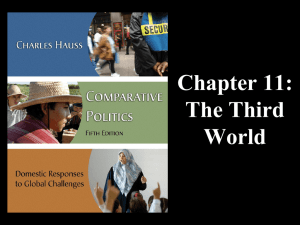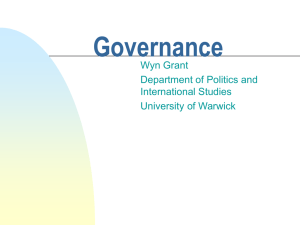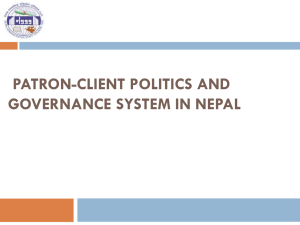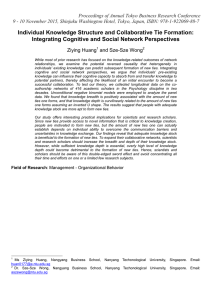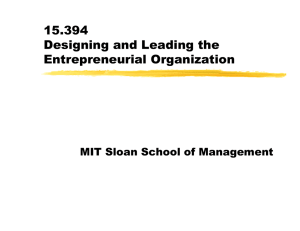Clientelism in Urban America: Building Trust for Democratic Governance
advertisement
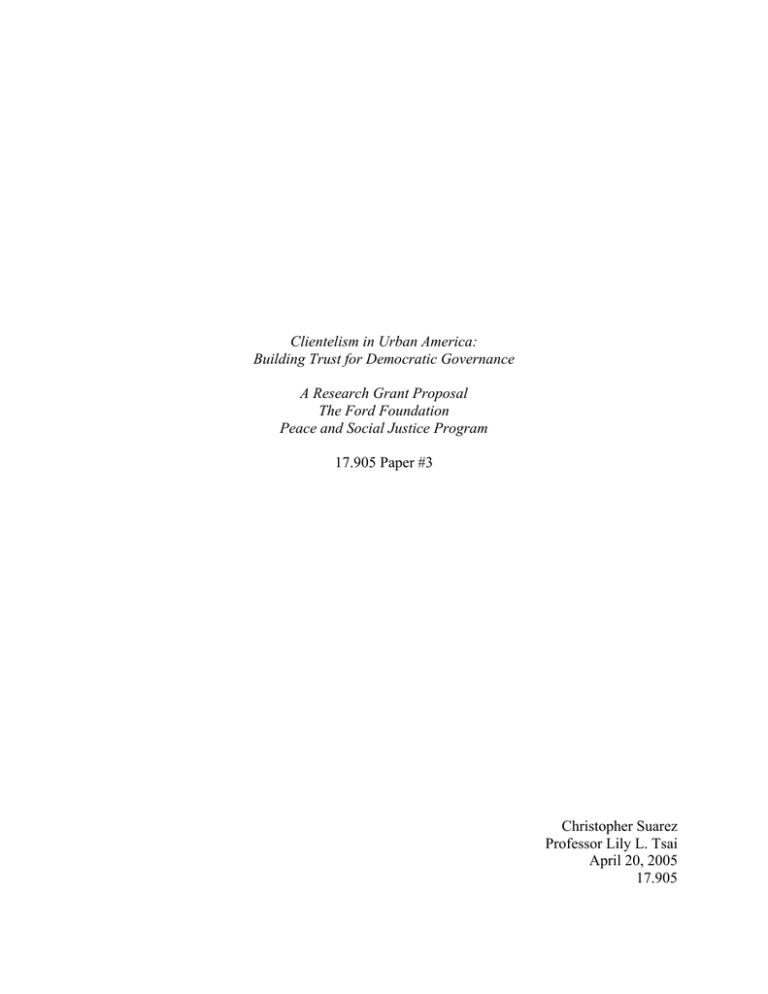
Clientelism in Urban America: Building Trust for Democratic Governance A Research Grant Proposal The Ford Foundation Peace and Social Justice Program 17.905 Paper #3 Christopher Suarez Professor Lily L. Tsai April 20, 2005 17.905 Suarez Clientelism in Urban America: Building Trust for Democratic Governance Research Overview Most of the current literature relating to clientelism in politics assumes that patron-client networks are antithetical to sound Democratic governance. But do they necessarily have to be? Are there some elements of clientelism we may want to keep? American cities represent a unique case in this debate. Unlike relatively homogeneous small cities or towns, a satisfied citizenry in large cities requires representation of an unusually diverse set of interests. From rich to poor, gold coast to ghetto, black to white, Puerto Rican to Asian, it is difficult, if not impossible, to appease large segments of an urban citizenry. When these large ethnic and/or socioeconomic divides exist, I argue that higher levels of patron-client ties may serve as a good complement to Democratic governance. In particular, this research project seeks to find an association between levels of patronclient ties and trust in government. The project will complement current theories that posit relationships between trust in government and good governance. Through interviews, data collection, and surveys, this study will assess levels of clientelism and trust in several American cities. As positive aspects of machine politics and patron-client networks are dismissed both in theory and in practice, it is imperative that we grasp an understanding of their place in urban politics now rather than later. Moreover, in a new generation – one in which most American cities have already made many progressive reforms – we must examine ways to re-shape our metropolitan institutions to better represent the poor and the destitute. In some cases, using the government to increase patron-client ties may be the way to do just that. And, even if this study fails to confirm the hypothesized relationship, we are left with an invaluable data set aids us in making myriad policy prescriptions that relate to levels of government trust in urban America. 1 Suarez Literature Review and Practical Relevance The debate on whether or not machine politics are effective and/or trustworthy in urban settings has been rattling for some time. After Richard J. Daley died in office in 1976, his obituaries not only lamented his passing, but also reflected on the passage of urban machine politics as we knew it. When his son, Richard M. Daley, was elected mayor just thirteen years later, however, many thought that this indicated a rebirth of urban machine politics. Many critics then assumed that an ensuing political machine would hurt the Chicago government. Instead, reform ensued.1 But does that necessarily mean the elements of machine politics are gone? What if the reforms were occurring as the government maintained high levels of patron-client ties? In the midst of his myriad reforms and award-winning initiatives (including a recent award from MIT for his efforts in public conservation), Daley is currently facing corruption charges for his relation to a “Hired Truck Program” which used private firms to haul debris and material from city construction sites. In the past, he has also been scrutinized for disproportionately awarding construction contracts to certain ethnic groups. After this most recent scandal, he was quoted as saying “there is nothing more important to me than maintaining the trust of all the taxpayers…we’ll do what’s necessary…we’ll get to the bottom of this.”2 As an award-winning mayor who has been elected to four consecutive terms by landslide margins, his goal is to maintain trust. But what does he mean when he says trust? And why may it be so important in sustaining good governance? For the purposes of this study, trust will be conceptualized in terms of the faith in the overall motives of the particular persons in government. That is, when a person perceives that the governing body has good intentions, we assume that person will have a greater trust towards that 1 2 Stave, Bruce M. “Urban Bosses and Machine Politics” The Reader’s Companion to American History. Rucker, Patrick and Ray Gibson. “US Agents Seize Files at City Offices.” Chicago Tribune May 1, 2005. 2 Suarez governing body. This is the trust that allows politicians like Daley to win votes, and the type of trust that gives people the confidence and motivation to get involved and help government out – the type of trust we care about in this study. It is important to address our non-use of one of the major counter-interpretations of trust. This interpretation, presented by Luhman (1980) and Williams (1988), argues that trust applies only to small number contexts. People will trust one another based on models of cooperation such as the prisoner’s dilemma. Under the model, one can have a reasonable expectation that there will be future interactions in which the trusted person may reciprocate. Thus, there is trust. However, such a game doesn’t generalize to interactions with large numbers of individuals, and Luhman argues that “participation in functional systems such as the economy…requires confidence, not trust.” This appears an exercise in semantics more than anything else. Because government actions represent an aggregation of several individual preferences, and government is often viewed by individuals as a monolithic entity, I would argue that people form attitudes towards government as if it were an individual. They can still trust government, and this is especially true when we define trust in terms of benevolent intentions.3 Having defined trust, I turn to some of the relevant theories in the literature that help explain the value high levels of trust may have on democratic governance. First, I discuss some of the theory presented by Tom Tyler, who discusses social trust. Second, I apply Mark Peel’s theories that relate to trusting disadvantaged citizens. Finally, I reflect on additional theories presented by Braithwaite and Hardin, who argue for the enculturation of trust and provide arguments that help explain why trust is particularly useful for urban politics. Each theory gives us a reason to better understand trust in urban America, and will be considered in our research. 3 Hardin, Russell. “Trust in Government.” From Ch. 1 Trust and Governance. Valerie Braithwaite and Margaret Levi, Editors: Russell Sage Foundation, 1998 p. 12-13 3 Suarez In Trust and Democratic Governance, Tyler discusses two types of trust. The first type of trust, instrumental trust, has a rational choice grounding and is based on expectations of reciprocity – like the conception proposed by Luhman and Williams, this type of trust is not the focus of our study, and is more difficult to apply to government institutions as a whole (albeit arguably applicable). The second conception of trust, social trust, is more useful for our needs and can have huge implications on government conformity and deference. Social trust, to Tyler, is linked to the sense of identity people derive from their relationships with authorities. Specifically, the theory suggests that people value social status and reputations, and that those concerns motivate compliance with group rules. It also suggests that trust in social authorities shapes judgments of an individual’s social status and reputations, and that treatment by social authorities leads to inferences about trustworthiness. In his conceptual model of social trust, Tyler groups social trust into two areas: pride and respect. We derive pride from the social groups we are in, and we maintain a social reputation with the hope of gaining respect. He cites several studies that verified statistically significant relationships between pride/respect and government compliance (Citizens in San Francisco, Employees at University of California Berkeley, and Bay Area Citizens).4 In line with our hypothesis, social trust can be fostered by patron-client relationships within cities. For example, if a big city mayor disproportionately rewards contracts to members of a certain socioeconomic or ethnic group, that group may feel as if it as a higher social standing than another less-represented group. If big city leaders were able to establish such ties with several groups within a metropolis, moreover, I would argue that this could lead to a general increase in social trust. How is each group supposed to know which group is receiving more 4 Tyler, Tom R. “Trust and Democratic Governance.” From Ch. 11 Trust and Governance. Valerie Braithwaite and Margaret Levi, Editors: Russell Sage Foundation, 1998. , p. 280-284 4 Suarez benefits? In addition, the mayor that holds local cookouts, supports the local sports leagues in certain areas, and puts efforts towards public works projects will make the residents of the benefited regions feel empowered to appreciate what the government is doing for it. Particularly for the impoverished, the community is all they have. The small things – getting food on the table, having adequate housing and public services, and being recognized – are what matter most. Moreover, the lower class and less educated have more of an interest in using politics for social mobility, making them more susceptible to clientelist politics.5 In general, by feeling empowered and achieving a sense of pride in their social standing as a result of patron-client ties, they are more than willing to give their votes. Because the poor and destitute care more about these microscopic-level issues, patronclient ties are more likely to increase their levels of trust than are patron-client ties for the rich and socioeconomically advantaged. Because the poor segments of the population represent a substantial minority and often fail to vote in larger national elections, establishing trust and positive relationships with them is often avoided in these situations. Cities, with concentrated levels of the poor who vote more often, provide a special context in which patron client-ties can benefit the disadvantaged. In smaller urban settings, moreover, there is less of an incentive to reach out to the upper classes to increase trust. This is because trust is generally established for these individuals by taking positions on larger issues (i.e. taxes and abortion). Because these larger issues tend to be so divisive, effectiveness in office will correlate strongly with disappointing or offending a large proportion of these constituents.6 And, whereas the rich and the socially empowered (and even the middle classes in some cases) will always provide financial resources to their candidates to 5 Greene, Kenneth F. “Against the Machine: Party Organization and Clientelist Politics in Mexico.” October, 2001. [Unpublished, Submitted for Peer-to-Peer Review], p. 15 6 Hardin, Russell. “Trust in Government.” From Ch. 1 Trust and Governance. Valerie Braithwaite and Margaret Levi, Editors: Russell Sage Foundation, 1998, p. 19 5 Suarez encourage their allocations of patron-client ties and/or pork, the poor and destitute won’t necessarily dole out what they have to give – their votes. They are primarily swayed by maintaining and increasing social ties. One of the most major concerns of disadvantaged citizens, as Peel argues, is a desire to feel accepted in society. Frankly, disadvantaged citizens are oftentimes just not trusted. Workers at welfare and other social agencies often interrogate disadvantaged citizens as they make benefit claims. There is often an assumption that the disadvantaged are “dumb” or “inadequate.” Peel further explains that the disadvantaged often feel powerless, and that they resent having to passively accept a third-party interpretation of their problems. 7 Admittedly, increased social trust due to additional patron-client ties may perpetuate such mistreatment. For example, after benefits were conferred to citizens by the hypothetical mayor as described above, it may be the case that people are socially empowered to such an extent that unsatisfactory levels of bureaucratic performance may be masked by a high perception of trust in the government. At the point people’s conceptions of themselves change and self-esteem increases due to higher levels of social trust, people may become more compliant. Thus, in performing this study, we will separately analyze trust that relates to one’s social standing and trust that directly relates to bureaucratic performance. In the meantime, however, we must acknowledge the potential that these two forms of trust may be correlated with one another. Even if we were to find that increasing patron-client ties increases social trust within destitute regions, we still must recognize the potential that some institutions may still fail post study. If high levels of patron-client ties promote social trust but damage institutions, finding a relationship between such ties and social trust may not have as great of implications for good governance. 7 Peel, Mark. “Trusting Disadvantaged Citizens.” From Ch. 13 Trust and Governance. Valerie Braithwaite and Margaret Levi, Editors: Russell Sage Foundation, 1998., p. 319 6 Suarez Another point we must consider is presented by Braithwaite. He argues that we must insist on enculturating trust by institutionalizing distrust. By institutionalizing distrust through laws, law enforcement, and an open civil society that serves as a check to the government, he argues that abuses of power such as violence, environmental destruction, and political corruption may be thwarted. If patron-client ties are high (and thus political corruption is high), it would then appear that there is more of an “institutional trust” in society if we assume this theory is true. By assessing the levels of trust we obtain in this study, we can gain some insight into that. We can thus glaze the surface in testing Braithwaite’s theory.8 Unfortunately, urban politics has lost a substantial amount of momentum in the last couple of decades. After producing high amounts of valuable theory throughout the first twothirds of the twentieth century, recent work of the urbanists has done little to bolster political science. Its focus, Danielson and Lewis argue, has been too much on the big cities, and that recent scholarship has led to a skewed perception of urban phenomena. They advocate a discourse in which a more general “politics of urbanization” is discussed, so as to ensure that the roles of suburbs and areas outside of the city proper are properly synthesized with the theory.9 I agree with this, and would advocate a future expansion of my initial study into the suburbs to see if the theory carries over to these areas. With the virtual nonexistence of the urban downtowns of the past and the reality of suburban sprawl, this makes sense. Nevertheless, I firmly believe that focusing on urban metropolises is critical to this study. In fact, I believe it will redirect the currently misguided and technically infiltrated debates in urban politics towards something more useful. 8 Braithwaite, John. “Institutionalizing Distrust, Enculturating Trust.” From Ch. 14 Trust and Governance. Valerie Braithwaite and Margaret Levi, Editors: Russell Sage Foundation, 1998. 9 Danielson, Michael N. and Paul G. Lewis. “City Bound: Political Science and the American Metropolis. Political Science Quarterly, 49:1:203220, March 1996. 7 Suarez In particular, this study is unique from the most recent emphases in the urban political field. Unlike the studies of Sayre, Kaufman, Elkin, Stone, and others, it is not a study that tries to assess the viability of elitist and pluralist paradigms in city governments. It is not, moreover, a study that discusses the factors for business influence and economic power in urban contexts. Rather, it is a study that allows us to examine a commonly criticized element of urban politics (patron-client ties) and determine if it may actually contribute to some things that are beneficial. And, while our initial results will only be applicable to large cities, we may be on the forefront of more general theoretical principles – we will understand various dimensions of trust within cities and their relationship with patron-client ties. Measures and Methods The methodology of this study operates on two fronts. First, I assess the preferences and beliefs of the citizens of each selected metropolis. This is necessary to determine levels of trust individuals within a city have for their government. Second, I collect information about the government institutions themselves – facts and internal beliefs – that will combine to provide some measure of the levels of clientelism within each city. The following paragraphs will discuss how exactly all of this information will be captured and conclude with an explanation of the approach to data analysis necessary to ground our results. To assess the levels of trust within a particular government, we will randomly select 10,000 residents from each city. Because all of the large cities in the selection pool are divided into (approximately equally populated) wards, we perform randomization at the level of each ward (we select 10,000/W from each, where W represents the number of wards). This way, we ensure that each major aldermanic constituency is well-represented in the survey, and that we can guarantee representation of both lower and higher-income wards (we will collect ward-level 8 Suarez census data). Although it will be impossible to randomize from the entire population within each ward (residential and/or telephone records may not account for some of the most destitute), this method should allow us to obtain a viable distribution of individuals within a given city. Having selected these individuals, we will distribute questionnaires to them. To discourage nonresponse, we intend to offer financial incentives to each respondent and will generally go door to door (although the telephone may be used on occasion). We will then pose questions that center around the two areas of trust we wish to focus on: social trust and, bureaucratic trust. We will also collect demographic data of the respondents (i.e. income, race), to identify groupings within each city that may have special significance. To assess trust, we will ask questions in the spirit of those suggested by Tyler (270). We want to know whether people believe the government “is genuinely concerned about your needs,” “considered your arguments,” “tried to do what is right for you,” or “tried to be fair to you.” We will group these questions as they relate to the types of trust described above. For social trust, we will ask questions about how one feels “socially connected” to the government. We will frame these questions in terms of whether people feel the government is genuinely concerned about your social needs. We will ask if people feel socially attached to government programs and ideals. Other questions will be directed at specific areas of social life. (Diagram of Dependent and Independent Variables) For bureaucratic trust, we will ask whether or not people believe workers at government agencies are concerned about needs and whether people feel trusted during bureaucratic transactions. This data will be particularly useful for those who are poorer, who we learned tend to feel distrusted in these situations. Finally, to test Braithwaite’s theory on a potentially institutionalized trust (or distrust), we can collect information on the degree to which people believe the “government 9 Suarez seeks to protect them,” “promotes public welfare,” and “staves off corruption.” And, while we can assess all of these measures of trust independently, we can group them together as well. While obtaining these trust indicators, half of the research team will be devoted to determining the levels of patron-client ties within each city. Patron-client ties, for data collection, are defined as direct relationships between the government and outside groups. They are about personal obligations and the exchange of favors.10 As we are collecting data for patron-client ties and trust over a year-long period, we acknowledge that major events could occur during data collection that may impact results relating to levels of trust beyond patron-client ties and all control variables we may use. Because we intend to survey at least ten cities, however, we doubt these problems will arise in many of the cases. Assessing the degree of patron-client ties is a more nebulous than simply surveying individuals about trust, but we have devised a good strategy for determining this. Before speaking with anyone, we intend to examine the most recent available financial records (specifically pork spending) of each city relative to the year the study is performed. This will allow us to see the allocations of various monies to each of the wards within the cities. In addition, we will scour public records and survey construction companies within each city to determine the extent to which public contracts are awarded to various firms. Because I have done research studies in the past and know insiders within construction unions, I will be able to seek out most of these companies. Insiders will also inform me about any rogue construction groups, as these groups operate against the union. Gathering this data will give us some sort of gauge on the patron-client ties between government and certain social/ethnic group within the cities. Although the methods above are the only ways in which I can gather empirical data to assess patron-client ties, we will conduct interviews of city bureaucrats from each city ward 10 Stone, Clarence N. “Urban Political Machines: Taking Stock.” PS: Political Science and Politics. 29:3:446-450, September 1996., p. 446 10 Suarez during the study. We will ask them about the legitimacy of various clientelist tactics that are specific to various ethnic and socioeconomic groups within each ward. Their beliefs on issues relating to clientelism and patron-client networks will serve as a useful proxy to the level of these networks. Because this proxy is best realized by interviewing those in power, these interviews will ideally be of aldermen themselves, but we may interview people who work directly with the aldermen if this is not possible. Admittedly, it would seem on-face that interviewing aldermen would yield skewed results because of an incentive to lie about patron-client ties. We take four steps to avoid this problem. First, we will frame our questions about the legitimacy of various clientelist tactics assuming that the alderman’s goal is simply to maximize votes. We know from rational choice theory that this is the primary goal of most politicians, and, by framing the question in this way, the politician will feel less inclined to inculcate moral standards into the answer. Second, the survey will only ask about “democratic clientelism.” In particular, this means the types of patronclient ties that don’t imply coercion or other violent measures (presumably, this represents the majority of clientelist ties in the US today anyway). Third, we will ask the controversial clientelist questions towards the middle of our interviews. Thus, the questions will be asked after the alderman hopefully feels somewhat comfortable with the interviewer. Finally, the clientelist questions will not be asked in rapid-fire succession. Instead, they will be interspersed with other questions so as to raise the cognitive difficulty of categorizing questions. Hopefully, these precautions will allow us to obtain accurate measures of levels of patron-client ties.11 From this discussion, we have seen that this study uses robust, multi-layered methods to collect data for both trust and clientelism. Upon collecting the data, we intend to run regressions 11 Greene, Kenneth F. “Against the Machine: Party Organization and Clientelist Politics in Mexico.” October, 2001. [Unpublished, Submitted for Peer-to-Peer Review] 11 Suarez to confirm or reject the various relationships. We will control for relevant variables. As necessary, we will do T-tests for differences of means to determine statistically sound differences in trust between groups. Study Implications and Benefits Ultimately, this study will achieve four major goals. First, we will understand levels of clientelism better within cities. Do strong patron-client ties still exist in cities? Are they there but just less obvious? Second, we can do comparisons of trust levels and different types of trust across social and ethnic groups. Are there particular institutions that need systematic improvement? Can we increase trust by improving them? Finally, we will be able to confirm or deny the hypothesized relationship between patron-client ties and trust, particularly for the urban poor and disadvantaged. For these people, breeding a sense of trust may serve huge tangible benefits for cities, as it can empower people to take actions to improve government when it was otherwise considered useless. Given how much work city governments still have to do to improve their infrastructures, the potential for this alone makes this study worth it. We still do not know how to solve the problem of urban poverty, and a better overall understanding of citizen trust within our cities could add a missing piece to that puzzle. 12 Suarez Works Cited Braithwaite, John. “Institutionalizing Distrust, Enculturating Trust.” From Ch. 14 Trust and Governance. Valerie Braithwaite and Margaret Levi, Editors: Russell Sage Foundation, 1998. Danielson, Michael N. and Paul G. Lewis. “City Bound: Political Science and the American Metropolis. Political Science Quarterly, 49:1:203-220, March 1996. Gimpel, James. “Reform-Resistant and Reform-Adopting Machines: The Electoral Foundations of Urban Politics.” Political Research Quarterly, 46:2:371-382, June 1993. Greene, Kenneth F. “Against the Machine: Party Organization and Clientelist Politics in Mexico.” October, 2001. [Unpublished, Submitted for Peer-to-Peer Review] Hardin, Russell. “Trust in Government.” From Ch. 1 Trust and Governance. Valerie Braithwaite and Margaret Levi, Editors: Russell Sage Foundation, 1998 Peel, Mark. “Trusting Disadvantaged Citizens.” From Ch. 13 Trust and Governance. Valerie Braithwaite and Margaret Levi, Editors: Russell Sage Foundation, 1998. Rucker, Patrick and Ray Gibson. “US Agents Seize Files at City Offices.” Chicago Tribune May 1, 2005. Stave, Bruce M. “Urban Bosses and Machine Politics” The Reader’s Companion to American History. Stone, Clarence N. “Urban Political Machines: Taking Stock.” PS: Political Science and Politics. 29:3:446-450, September 1996. Tyler, Tom R. “Trust and Democratic Governance.” From Ch. 11 Trust and Governance. Valerie Braithwaite and Margaret Levi, Editors: Russell Sage Foundation, 1998. 13 Suarez Appendix A: Grant Specification PUBLIC POLICY/LAW Ford Foundation Peace and Social Justice Program Foundation's home page http://www.fordfound.org/program/peace_main.cfm 14
